#anti surrogacy sunday
Explore tagged Tumblr posts
Text
Finally someone in office calling out international surrogacy for being a new form of human trafficking.
By Joshua Solano Nov 02, 2024, 4:13 am
THE Bureau of Immigration (BI) is sounding the alarm over the increase in human trafficking cases involving women recruited for illegal surrogacy abroad, following the repatriation of seven victims on October 23, 2024.
These women, aged 20 to 30, were recruited to work as surrogate mothers for unknown clients abroad, the BI said in a press release on Saturday, November 2, 2024.
Merriam-Webster defines a surrogate mother as a "woman who becomes pregnant by artificial insemination or by implantation of a fertilized egg created by in vitro fertilization for the purpose of carrying the fetus to term for another person or persons."
The BI said three of the victims left the country under the guise of visiting relatives but fell victim to deceptive promises of surrogacy. The remaining four had no records and likely exited through unauthorized means, the BI added.
BI Commissioner Joel Anthony Viado said investigations reveal a scheme where traffickers recruit online, then arrange complex travel through multiple borders to avoid detection.
“The Philippines is being targeted by traffickers who lure women with surrogacy offers. We urge Filipinos to avoid these offers, as surrogacy abroad often carries serious legal risks,” Viado said.
In October, 20 Filipino women were rescued by authorities after reportedly being trafficked to become surrogate mothers. Of the 20 women, 13 were pregnant through artificial means.
The pregnant women were supposed to be transferred to another country where they would give birth. The seven others were deported by the Cambodian government over immigration law violations. BI officers also intercepted a 37-year-old woman recruited for surrogacy and headed to Georgia on October 15.
Senator Risa Hontiveros, who chairs the Senate Committee on Women, Children, Family Relations and Gender Equality, has earlier sought the conduct of a congressional inquiry into this "new form" of a human trafficking scheme victimizing Filipino women. (JGS/SunStar Philippines)
#THE Bureau of Immigration (BI)#Anti surrogacy sunday#Surrogacy exploits women#Babies are not commodities#International surrogacy is Human Trafficking#Senator Risa Hontiveros is willing to call surrogacy exploitative#Senate Committee on Women#Children#Family Relations and Gender Equality
20 notes
·
View notes
Text
For women in Dublin, here's your chance to take a leaf out of the Swedish anti-surrogacy activists' book and be visible on the streets. It's possible to create a successful protest with a few people and leaflets, here's an example of a protest that two women did in Stockholm leafleting against a surrogacy broker (Swedish but google translate is fine):
(I don't know if anyone is planning a protest already, but check out Surrogacy Concern and Radicailín)
#anti surrogacy saturday#okay its sunday today but this event is on a saturday so still counts i guess :D
29 notes
·
View notes
Text
Reminded me about this clip I saw (the bit I’m talking about is at the very end, 25 minutes in). It's about a woman who was in anguish handing over her baby. The egg comes from one woman, the gestation from a surrogate, and the milk ordered from some other random woman somewhere, and all of this has to fall into place, and when it doesn’t, that’s okay, your surrogate’s already being paid to be psychologically tortured:
youtube
1K notes
·
View notes
Text
Alex Greenwich has 'good news and bad news' on Equality Bill
New Post has been published on https://qnews.com.au/alex-greenwich-has-good-news-and-bad-news-on-equality-bill/
Alex Greenwich has 'good news and bad news' on Equality Bill

The NSW Government will this week consider a scaled-back version of independent MP Alex Greenwich’s long-delayed Equality Bill.
The out Sydney MP introduced the omnibus bill last year, containing a range of discrimination-busting amendments.
The amendments, if passed, would finally improve various NSW laws that are sadly some of the worst in the country for LGBTQIA+ people.
On Sunday, Alex gave some “good news and bad news” on the bill, saying that crucial reforms benefiting trans people would progress, but other amendments were delayed.
“The good news: Premier Chris Minns has indicated support to allow trans people to update their birth certificates,” Alex wrote.
“We are advancing a number of other reforms like parentage rights for kids born in overseas commercial surrogacy arrangements, domestic violence protections for the LGBTIQA+ community, and modernising some laws around sex work.”
The MP said he hopes those amendments pass the parliament in the next fortnight.
New South Wales is one of the last states in Australia still forcing trans and gender-diverse folk to undergo surgery in order to affirm their gender on their birth certificates.
Premier Chris Minns spoke in favour of removing this archaic requirement earlier in the week.
View this post on Instagram
A post shared by Equality Australia (@equalityaustralia)
Anti-discrimination reforms delayed
However, other parts of the Equality Bill have been removed. Some of the provisions have come under fire from religious groups.
Alex Greenwich said he’d removed proposed changes to the NSW Anti-Discrimination Act, which would have banned private schools from discriminating against gay or trans teachers and students and teachers.
Alex said, “The bad news: the Government won’t consider any changes to the anti-discrimination act to protect LGBTIQA+ teachers and students until the review of the Anti-Discrimination Act is completed.
“This is expected early next year and I will use this process to pursue reform.”
Alex Greenwich said on Sunday he’d received an “immense barrage” of homophobic abuse after introducing the bill.
He urged colleagues to support the scaled-back version in the parliament and pass “a number of laws that make NSW safer for the LGBTIQA+ community” by the end of the month. Watch this space!
View this post on Instagram
A post shared by Alex Greenwich MP (@alexgreenwich)
Read more:
NSW MPs told to stay away from Mardi Gras until Equality Bill is passed
Community groups dismayed at delays over NSW Equality Bill
Alex Greenwich wins defamation case against Mark Latham
For the latest LGBTIQA+ Sister Girl and Brother Boy news, entertainment, community stories in Australia, visit qnews.com.au. Check out our latest magazines or find us on Facebook, Twitter, Instagram and YouTube.
0 notes
Text
No Cake Or Babies For You
The summer of 2018 has had some rough spots when it comes to the legal outlook for LGBTQ hopeful parents. That’s true both in the United States and internationally.
On the heels of several good years of Supreme Court terms, October Term 2017 was a dud. Two years ago, 2015 brought us Obergefell, the U.S. Supreme Court decision making same-sex marriage legal throughout the country. And in last year’s Pavan, the Court reiterated that those Constitutionally guaranteed protections included the “constellation of rights that come with marriage.” Like being a parent. Or, more specifically in that case, being treated equally under a state assisted reproductive technology statute.
But red flags have been popping up that we may be headed back in the other direction. Last month, the Court issued its long-anticipated ruling in Masterpiece Cakeshop (where a cakeshop owner refused to make a wedding cake for a gay couple). While the judgment was specific to the case and very narrowly addressed only situations where religious animus in the administrative process had tainted the proceedings, the end result was that it ruled in favor of the cakeshop owner who had denied services to the gay couple. And now, if you get past the wedding (cake or no cake), and want children, the stars forming that “constellation of rights that come with marriage” for hopeful LGBTQ parents may feel a little less bright.
Supreme Disappointment
The announcement of Justice Anthony Kennedy’s retirement came as a shock to many. Credited as a key swing vote supporting LGBTQ rights, Kennedy will be missed. The nominee for Kennedy’s seat on the Court, Brett Kavanaugh, has been declared anti-LGBTQ and anti-civil rights by Lambda Legal, a prominent LGBTQ advocacy organization. While Kavanaugh’s record on the bench with the D.C. Circuit is hard to read in this context, it certainly points in a very conservative direction.
No Discriminating Against Discriminators
Last week, the House Appropriations Committee adopted an amendment to a proposed funding bill that would prohibit the withholding of funding from adoption agencies because of their “sincerely held religious beliefs or moral convictions.” The amendment worked to protect religious-based agencies, regardless of refusal to work with LGBTQ couples, on multiple levels. It also mandated that the federal government withhold 15 percent of federal funds for child welfare programs from states discriminating against agencies that discriminate.
A number of jurisdictions — such as California, Illinois, Massachusetts, and Washington, D.C. — have made it illegal for adoption agencies to discriminate against same-sex couples. The funding amendment would reduce federal funding for these jurisdictions to punish them for making discrimination illegal. In most cases, that will likely be about a sincerely held religious belief that LGBTQ persons should not be able to adopt children. But of course, the discrimination doesn’t have to be anti-LGBTQ. It could be, for instance, anti-Jewish, anti-Muslim, or anti-single person.
The full bill still has a ways to go before it would be law, because it would first need to pass both the House and the Senate, and then signed by President Trump. So the machinery of government may yet stop the bill’s chance of becoming law. So no panicking on this one yet.
No Surrogacy For Gay Israelis
Parental rights are not just an American issue. Israel just passed an amendment to their surrogacy statute continuing the exclusion of gay couples from using surrogacy within the country. LGBTQ persons have been fighting for some time to be included. Under the old law, only married heterosexual couples could pursue surrogacy within Israel. Everyone else (singles, gay couples) had to go abroad (like to the U.S.) if surrogacy was their only, or preferred, path to a child.
The amendment that passed today is (kind of) exciting for single women. The revised statute allows single women to grow their family via surrogacy, and increases the number of children permitted by surrogacy from two to five. But LGBTQ individuals and couples remain out.
Israeli Knesset member Itzik Shmuli called out the exclusion. “We are good enough to serve the country, but not to be parents. It’s an insult I cannot describe. It is a situation that is simply discriminatory, painful, and full of insults and dishonesty. This is wrong.”
I asked Victoria Gelfand, an Israeli family formation attorney, for her thoughts. She agreed with Shmuli. “Such discrimination via legislation in 2018 is outrageous.” She also argued that the amendment was in direct contradiction to an order of the Israeli High Court last year that parliament should weigh in and amend the surrogacy law to make the law more equitable.
Gelfand also pointed out how narrow the amendment is — only permitting single women using their own eggs, while probably the majority of women who can’t carry a pregnancy can’t produce viable eggs either. The amendment does not allow surrogacy for single women using donated eggs, single men, same sex couples or co-parents not in a relationship. Ouch.
In the last couple days, thousands have been out in Israel protesting the exclusion of LGBTQ families and more action is expected with a call for a strike by community members this Sunday. Here’s to hoping their voices are heard. At least Israeli gay couples (who can afford it) can still come to the U.S. We hope. As we hold our breath that the latest U.S. anti-LGBTQ funding bill is just an anomalous blip. And that our new Justice surprises us all.
Ellen Trachman is the Managing Attorney of Trachman Law Center, LLC, a Denver-based law firm specializing in assisted reproductive technology law, and co-host of the podcast I Want To Put A Baby In You. You can reach her at [email protected].
No Cake Or Babies For You republished via Above the Law
0 notes
Text
After stories like this break I always hope it will lead to those supporting surrogacy to agree that there needs to needs to be more regulations.
IVF Centers in Delhi NCR: CBI Uncovers Child Trafficking and Fake Doctors in Fertility Clinics
CBI investigation reveals alarming illegal activities in Delhi NCR fertility clinics, including child trafficking, illegal surrogacy, and employment of unqualified practitioners. The probe exposes violations of the Surrogacy Regulation Act 2021 and links to organized crime. This shocking revelation raises urgent questions about regulation and patient safety in the fertility industry, prompting calls for immediate reform and stricter oversight.
Posted byby Ajay Gupta Political journalistAugust 3, 2024
NEW DELHI, August 3, 2024 – A recent investigation by the Central Bureau of Investigation (CBI) has unveiled a disturbing network of illegal activities within In Vitro Fertilization (IVF) centers across Delhi NCR, sending shockwaves through the fertility industry and raising urgent questions about regulation and oversight.
IVF Centers in Delhi NCR Key Findings
Numerous IVF centers Delhi NCR implicated in child trafficking schemes
Surrogate mothers exploited in violation of the Surrogacy (Regulation) Act, 2021
Organized syndicates linked to organ trade and forced begging identified
Fake medical credentials and forged adoption documents discovered
The Investigation Unfolds IVF centers Delhi NCR
The CBI’s probe, which began as an inquiry into a single child trafficking incident, quickly ballooned into a comprehensive examination of the fertility industry in the National Capital Region. Investigators uncovered a complex web of illegal activities, with some IVF centers serving as hubs for various criminal enterprises.
“What we’ve found is deeply troubling,” said CBI spokesperson Rajesh Kumar. “These centers, which should be helping families, have instead become conduits for exploitation and trafficking.”
A Pattern of Abuse Illegal IVF centers
The investigation revealed multiple schemes operating under the guise of legitimate fertility services:
Baby Trafficking: Newborns purchased from surrogate mothers were sold to childless couples or, more alarmingly, to criminal networks.
Illegal Surrogacy: Despite the ban on commercial surrogacy, many centers continued to offer paid surrogacy services, exploiting economically vulnerable women.
Document Forgery: Staff at several clinics were found creating false adoption papers and medical records.
Unqualified Practitioners: Some centers employed individuals with fake medical degrees, putting patients at severe risk.
Legal Framework and Violations
The Surrogacy (Regulation) Act, 2021, explicitly prohibits commercial surrogacy in India, allowing only altruistic arrangements. However, the CBI’s findings indicate widespread disregard for these regulations.
“The law is clear,” explained Dr. Shalini Mishra, a legal expert in reproductive rights.
“Surrogacy can only be altruistic, with no financial compensation beyond medical expenses. What we’re seeing here is a blatant violation of both the letter and spirit of the law.”
The Greater Noida Gang
In April 2022, authorities arrested a gang operating out of an IVF center in Greater Noida. The group, which included two female employees of the clinic, lured prospective parents with promises of baby boys, a practice strictly forbidden under Indian law.
The Fake Doctor Incident
September 2022 saw the arrest of an IVF clinic owner following the death of a woman during a procedure. Subsequent investigation revealed the owner’s medical degree was fraudulent.
The Egg Donor Mastermind
A 2021 case involved the rescue of a two-year-old child from a trafficking ring. The operation’s leader was discovered to be an egg donor with connections to multiple hospitals in the region.
Implications IVF Centers in Delhi NCR
The scale of illegal activities uncovered by the CBI raises serious concerns about the oversight of fertility clinics in India.
Dr. Amit Banerjee, a reproductive health specialist, warns of far-reaching consequences:
“This isn’t just about illegal adoptions or surrogacy. We’re talking about potential links to organ trafficking, forced labor, and other forms of exploitation. The ramifications for public health and safety are enormous.”
As the investigation continues, calls for reform are growing louder. Experts suggest several key steps:
Enhanced Monitoring: Implement more frequent and rigorous inspections of IVF centers.
Stricter Licensing: Tighten requirements for operating fertility clinics.
Patient Education: Launch public awareness campaigns about legal surrogacy and adoption processes.
Inter-Agency Cooperation: Improve coordination between health authorities, law enforcement, and child welfare organizations.
The CBI’s investigation into illegal IVF centers in Delhi NCR has exposed a dark underbelly of the fertility industry, highlighting urgent needs for reform and vigilance. As authorities work to dismantle these criminal networks, the challenge remains to ensure that legitimate fertility services can operate safely and ethically, providing hope to families while protecting the vulnerable from exploitation.
For the latest updates on this developing story, visit the CBI’s official website or follow our continuing coverage.
#Anti surrogacy#Anti surrogacy sunday#Surrogacy exploits women#Babies are not commodities#No one is entitled to biological offspring#International surrogacy is human trafficking#India#new delhi#Surrogacy creates children with no one looking out for them#Surrogacy creates children without a parents protection
20 notes
·
View notes
Text
It's not everyday this blog agrees with the Pope but when it comes to surrogacy we agree that it exploits women and babies.
Rome — Pope Francis on Monday called for surrogate motherhood to be banned worldwide, calling the practice of surrogacy "deplorable" and saying an unborn child "cannot be turned into an object of trafficking."
In a wide-ranging speech to ambassadors of the 184 countries that have diplomatic relations with the Vatican, the pope said surrogacy represented a grave violation of the dignity of the woman and the child and that it exploited surrogate mothers' financial circumstances.

Pope Francis leads the Angelus prayer at the Vatican, Jan. 7, 2024.VATICAN MEDIA/HANDOUT VIA REUTERS
"A child is always a gift and never the basis of a commercial contract," Francis said.
In 2022, the pope called surrogacy "inhuman," saying "women, almost all poor, are exploited, and children are treated like goods."
Laws on surrogacy differ widely around the world. Only a few countries, and some states in the U.S., allow commercial surrogacy. Others allow "altruistic" surrogacy, where no money is exchanged. Many other nations, including most in Europe, have banned it altogether.
Francis included surrogacy in his list of conflicts and divisions threatening world peace in his annual speech to the diplomat corps, sometimes referred to as the pontiff's "state of the world" address. This year he also reflected on the ongoing wars in the Gaza Strip and Ukraine, the immigration crisis, climate change, arms proliferation, antisemitism, the persecution of Christians and artificial intelligence, among other topics.
The pope said the wars in Gaza and Ukraine prove that all conflicts end up indiscriminately affecting civilian populations where they are fought.
"We must not forget that grave violations of international humanitarian law are war crimes," he said.
#Pope Francis#Anti surrogacy sunday#Surrogacy exploits women#Babies are not commodities#Reproductive purchasers#Child trafficking#Surrogacy is a grave violation of the dignity of the woman
53 notes
·
View notes
Text
She's right and she should say it.
Apr 12, 2024
MELONI-SURROGACY:Surrogate parenthood is 'inhuman', Italy's Meloni says
Surrogate parenthood is an "inhuman" practice that treats children as "supermarket products," Italy's prime minister said on Friday, urging parliament to pass a bill to prosecute those who go abroad for it.

Italian Prime Minister Giorgia Meloni remarked about surrogate parenthood being 'inhuman' during an event. (REUTERS)
Parenting via surrogacy is already illegal in Italy, punishable with jail and fines, but the right-wing coalition of Giorgia Meloni has vowed to impose an even stricter ban on it as part of its conservative agenda.
"No one can convince me that it is an act of freedom to rent one's womb, no one can convince me that it is an act of love to consider children as an over-the-counter product in a supermarket," she said at an event in Rome.
"I still consider the practice of uterus renting to be inhuman, I support the proposed law making it a universal crime."
The Italian parliament is discussing a bill drafted by Meloni's Brothers of Italy party to prohibit Italians from having a baby in countries where surrogacy is legal - such as the United States and Canada.
The party's position echoes the Vatican's.
The bill, approved by Italy's lower house Chamber and now at the Senate, has been criticised by rights groups and some opposition politicians who see it as targeting LGBTQ people.
"The issue cannot be tackled with universal prohibition, but with regulation that balances the rights at stake," ex-foreign minister Emma Bonino told daily Corriere della Sera this week.
#Italy#Anti surrogacy sunday#Surrogacy exploits women#Babies are not commodities#Italian Prime Minister Giorgia Meloni is telling the truth#Surrogacy is human trafficking#No one is entitled to biological offspring
52 notes
·
View notes
Text
It's not "Procreative tourism" its human trafficking
The gay couple, who travelled to the US for the birth of their son, could be among the first Italians prosecuted under a new ban on domestic surrogacy

A protest in support of surrogacy in Italy. The banner reads: ‘We are families, not crimes’. Photograph: Alessandra Tarantino/AP
Italy
The Italian parents of a child who was recently born in the US via surrogacy say they are too afraid to return home since Giorgia Meloni’s government enacted the west’s most restrictive law against what she described as “procreative tourism”.
The gay couple could be among the first Italians to be prosecuted under the law, enacted in early December, which extended an outright ban on domestic surrogacy by making it a universal crime that transcends borders, putting them on a par with terrorists, paedophiles and war criminals.
The measure can lead to prison terms of up to two years and fines of between €600,000 and €1m (£500,000 and £840,000).
The couple’s son was born in San Diego, California, in mid-February. “They are very worried about returning to Italy because there’s the prospect of jail and fines,” Gianni Baldini, a lawyer for the pair who has made the case public on their behalf, told the Guardian. “They are now evaluating the possibility of remaining in the US.”
Meloni’s far-right Brothers of Italy had long campaigned for those who seek surrogacy abroad to be criminalised. After the law, which only applies to Italian citizens, was passed in parliament in October, Meloni said it was needed to “fill a regulatory gap to also prevent this inhumane practice in procreative tourism”. The measure is among several socially conservative policies pursued by her government in its quest to promote so-called traditional family values.
Until the international ban was enacted, an estimated 250 Italian couples sought surrogacy overseas, the vast majority of them straight people who turned to surrogates for health reasons.
The practice is legal and regulated in 66 countries, although most Italians access the procedure in the US or Canada, where surrogacy is not specified on the birth certificate and where their child can obtain immediate US or Canadian citizenship.
Baldini believes there could be “a few dozen” children who have been born abroad via surrogacy since the law was enforced. “We don’t know how many couples are currently in this situation, but from cases I have assisted in the past, I do know there are those who simply do not want to talk about it as they are afraid,” he said.
The couple in San Diego are both employed by a multinational company and so could potentially stay and work in the US; however, Baldini said they are also concerned about the climate towards LGBTQ+ families under Donald Trump’s administration, especially if the US president pursues his pledge of ending birthright citizenship.
The Italian law does not apply retroactively but even though the pregnancy was conceived before it was enacted, now that their son has been born the couple still risk prosecution if they return to Italy.s
Baldini said a court battle in Italy would probably deter the couple. “It would be very delicate and there would be publicity surrounding the baby. They want to protect their child and don’t want their situation to become a cinema-style story.”
However, if the case did reach court, Baldini said he would aim to take it to Italy’s highest level and argue that the law is unconstitutional. “This is because it violates the principle of double jeopardy – you can’t be criminalised for something if it was not a crime in the country in which it was committed.”
The law was partially founded with the aim of protecting poor women around the world who are exploited for surrogacy. “There are certainly women who are exploited, but this happens in countries where there is no regulation,” said Baldini. “Italy can’t argue that surrogates in California are being exploited because in California it is perfectly legal.”
#Anti surrogacy sunday#Surrogacy exploits women#Babies are not commodities#International surrogacy is human trafficking#Procreative tourism is just a cute name for human trafficking#No one is entitled to biological offspring
5 notes
·
View notes
Text
"Until recently, a meeting between them was unlikely. Their worlds are quite different: one is an outspoken atheist feminist from France, the other is a Reformed politician from the Netherlands." In other words it is possible for people who usually oppose each other on social issues to agree on something.
One an outspoken atheist feminist from France, the other a Reformed politician from the Netherlands. "We form an interesting but important coalition." Photo CNE.news
European Union
People hardly ask questions about surrogacy, notice the French activist Olivia Maurel and the Dutch Member of the European Parliament Bert-Jan Ruissen. "People have no idea what kind of market is behind this."
Until recently, a meeting between them was unlikely. Their worlds are quite different: one is an outspoken atheist feminist from France, the other is a Reformed politician from the Netherlands. Despite these differences, French activist Olivia Maurel and SGP MEP Bert-Jan Ruissen find common ground in their shared mission: a worldwide ban on surrogacy. "We form an interesting but important coalition", Ruissen says.
Maurel and Ruissen are examples of the flanks of this politically diverse coalition, which has grown significantly in recent years. In early April, they met at the Casablanca conference in Rome. There, politicians, legal experts, and medical professionals gathered to discuss a global ban on surrogacy.
During the conference, there was little opportunity for an in-depth conversation. At the request of the CNE.news, Maurel and Ruissen spoke again at the end of April via a video call about their objections to surrogacy. "We use a woman for her uterus and take a child away from the mother immediately after birth," says Maurel, who was born through surrogacy. "That's why Olivia's story is so important," Ruissen adds. "People need to know the consequences of this practice."
In surrogacy, a woman carries and gives birth to a child for another, whether or not for financial compensation. The commercial market for this is growing from 14 billion dollars in 2022 to an expected 129 billion dollars in 2032.
Personal
For Maurel, this debate is personal. She was born in 1991 to an American surrogate mother. The publication of her story on CNE.news in October last year brought her into contact with the organisation behind the Casablanca Declaration. With this Declaration, politicians, jurists and other experts call on countries to ban surrogacy within their territories.
Shortly after they connected, Maurel became the spokesperson for the Casablanca Declaration. She shared her life story in various parliaments and had a private audience with the Pope. "I told him I am an atheist but that we need to work together on this issue," says Maurel. "He is very kind; he understood me and was very open to my story."
Politicians she addressed also showed understanding, says Maurel. Yet, she also sees some naivety. "Not everyone realises how much this market has been commercialised. It sounds nice: a woman helping another couple fulfil their desire for children. But people have no idea what kind of world is behind this."
MEP Ruissen signed the Casablanca Declaration in April. He shares Maurel's observation. "With surrogacy, you cross an ethical border when you intentionally do not let a child grow up with its mother. In this debate, the desires of adults seem to be more important than the child's interests."
Maurel and Ruissen largely agree with each other's arguments despite their different backgrounds. Both focus on the child in their objections to surrogacy. "We must prioritise the child in this discussion," says Ruissen. "With surrogacy, we prioritise the child in a contract," adds Maurel. "We ignore children's rights for the desires of adults."
Momentum
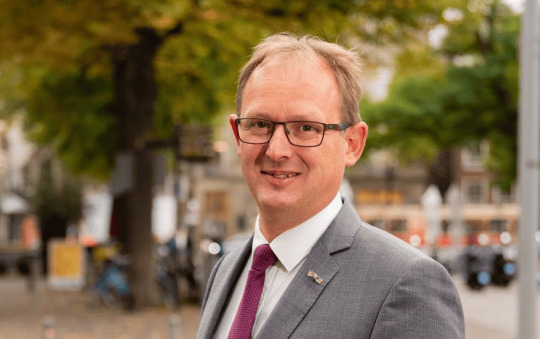
In European politics, surrogacy is on the political agenda, Ruissen says. Last week, the European Parliament adopted a directive banning the exploitation of surrogate mothers. Maurel was present at the vote. “While this is not a condemnation of the practice as such, it is quite an achievement”, she says. “It is a step into the right direction, Ruissen adds. "We have momentum, and we must use it." A group of French parliamentarians did just that on Tuesday when they proposed enshrining the ban on surrogacy in the French constitution.
A politically diverse coalition around a particular issue is not new. In discussions about gender, feminists and conservatives also find common ground. But Ruissen and Maurel see around the topic of surrogacy not only shared ambition but also results. "In the European Parliament, you see people from the extreme left to the extreme right coming together on this issue," says Maurel. "That's why we also try to work with various parties outside our political bubble," Ruissen responds. "It is so important that we work together when it comes to human dignity." That is what it is all about, says Maurel. "It's about more than just surrogacy. Sometimes, we seem to forget, but human dignity is at stake."
Money
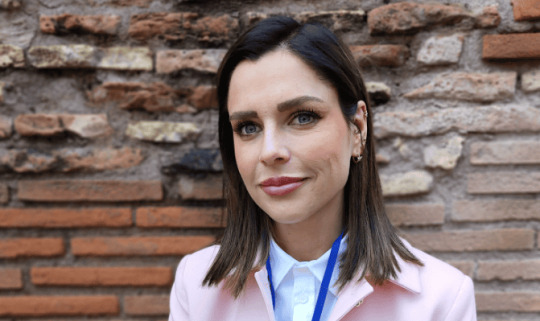
"If we as a society start buying and selling children, we are heading in the wrong direction," says Maurel. Photo CNE.news
Maurel knows the consequences of surrogacy like no other: she inherited her mental health issues from her surrogate mother, who is also her biological mother. Additionally, she struggled with the fact that her parents had paid for her; knowing this made talking about it difficult. "It felt like: Olivia, suppress your feelings; they may have spent more than $150,000 to get you," she said earlier to CNE.news.
Still, she stepped forward to share her story. "Our society is heading in the wrong direction and no longer protects the most vulnerable: women and children. I don't want my children to live in such a world," explains the mother of three. However, she pays a price for her openness: "My speech in the Czech Parliament ended the relationship between me and my parents."
Despite these struggles, Maurel has no negative feelings towards her parents. "They just used the means available to them without being aware of the consequences." Maurel also sees that her story does not apply to every child. "I am sure that there are also beautiful surrogacy stories. But such successes do not make the practice more ethical."
Since Maurel began seeking publicity with her story, she has come into contact with other children of surrogate mothers. They often dare not speak out, the activist observes. "Some are still dependent on their parents, and others do not want to be abandoned again. They struggle with a conflict of loyalty."
Contract
Both Maurel and Ruissen focus their arguments on commercial surrogacy. Altruistic surrogacy, in which women carry a child without any financial reward, accounts for a small percentage, about 2 per cent. However, both Maurel and Ruissen oppose this as well. "Even with altruistic surrogacy, you still need a contract," says Maurel. "And you still separate children from their mothers”, Ruissen adds. “That is an ethical boundary we should not cross."
For most people, surrogacy is a distant issue, Maurel acknowledges. However, she believes this does not diminish the importance of discussing it. "Not everyone struggles with reduced fertility or has the money to do this. But if we as a society start buying and selling children, we are heading in the wrong direction. That's why we need to have this debate."
#Olivia Maurel#Bert-Jan Ruissen#Olivia Maurel was born through surrogacy#Who better to critic it then the children created through the process?#commercial surrogacy is growing from 14 billion dollars in 2022 to an expected 129 billion dollars in 2032#Surrogacy exploits women#Babies are not commodities#Anti surrogacy sunday#It's impossible to have an ethical business from creating babies just to separate them from the birth mother#the Casablanca Declaration#No one is entitled to biological offspring#Altruistic surrogacy accounts for a small percentage of surrogacy cases
15 notes
·
View notes
Text
Gwen Stefani is 54 and Blake Shelton is 47. Waiting too long to have a kid together is not infertility.
Gwen Stefani and her husband Blake Shelton want to have a baby through surrogacy.
A source spilled to the National Enquirer, “Gwen and Blake have been wanting a baby of their own for years now.”
“They’ve had surrogates on board, but something always seems to fall through at the last minute. It’s been a struggle,” shared an insider.
Gwen , who has three children with her ex-husband Gavin Rossdale, revealed thet they had been trying to get pregnant before their 2021 wedding.
Another source revealed that the couple had “ no luck with conventional methods, the pair looked to surrogacy”.
“They’ve even talked to other celebrities who’ve used surrogates successfully, like Nick Jonas, whom they befriended on The Voice,” remarked an insider.
However, nothing has worked out as other source revealed, “It must be a complicated situation.”
“Maybe something just didn’t feel right for Gwen or Blake or both of them,” continued another source,
The source told the outlet, “In one instance, friends say Gwen wanted to use a surrogate in California and Blake wanted someone far removed from Hollywood.”
In another case, the surrogate “backed out because of the pressure. When it doesn’t work out, it’s wrenching for Gwen and Blake”.
“They both want to connect with the surrogate because there’s a lot at stake,” stated an insider.
The source added, “It’s a huge commitment and they just want to get it right.”
“While this whole process has been extremely difficult for them, it’s really brought them closer together,” mentioned an insider.
The source stated, “Blake just wants Gwen to be happy and she wants the same for him. She knows he desperately wants to be a dad.”
#Anti surrogacy sunday#Surrogacy exploits women#Wanting to have kids later in life#Babies are not commodities#If they have a kid nearing and after 50 while working in the music industry how much time and energy will they have for the kid?#Would the hell ate they doing that make potential surrogates back out?
13 notes
·
View notes
Text
As long as women live in poverty and are vulnerable to exploitation there needs to be greater regulation in commercial surrogacy.
As we all know, pregnancy generally takes around nine months, plus recovery time. And humans aren’t great at having much more than one or two children at once. That really limits how many children one person or couple can have at a time.
Or at least it used to.
Assisted reproductive technology and gestational surrogacy have changed what’s possible for human reproduction. For those suffering medical or other obstacles, surrogacy can be a miracle solution to parenthood. Others, however, are pushing the limits on the possibilities provided by the new technology.
1,000 Children, Please
Japanese businessman Mitsutoki Shigeta made headlines in 2014 when Thai authorities discovered nine babies being cared for in a mostly unfurnished condo in Bangkok. The children were all genetically related to Shigeta, and born by surrogacy. Mariam Kukunashvili, a co-founder of the Thai fertility clinic that assisted Shigeta in finding surrogates, reported Shigeta to Thai authorities after Shigeta “revealed plans for more than 1,000 children.” Kukunashvili and Thai authorities were concerned that Shigeta may be involved in human trafficking.
Yet a Thai court later awarded Shigeta custody of all nine of his children, in addition to other children who were genetically related to him, and found elsewhere. After hearing evidence, the court also found no evidence of human trafficking. So, a happy ending?
Not quite.
Shigeta’s case was not the only one grabbing headlines as to the questionability of surrogacy. Another nightmare case around the same time. There, an Australian couple conceived twins via a Thai surrogate. After the twins’ birth, reports came out that the parents returned to Australia with only one of the twins, leaving behind the other twin, who had been diagnosed with Down syndrome. (Although it later came to light that the parents tried to leave with both babies and were unable to.)
In 2015, Thailand responded by banning non-Thai citizens from paying Thai women to act as surrogates, including the potential of a 10-year prison sentence for violators. The result was a complete shutdown of Thailand’s international surrogacy practices.
As frequently happens, when one country shuts down international surrogacy, another country sees a rise in business. In the past couple of decades, the Eastern European country of Georgia has seen surrogacy grow in popularity. But that looks like it may all end as well.
20 Kids In A Year
Shigeta isn’t the only one to look to surrogacy to have a high number of children in a short time. One couple in Georgia has received media coverage over their fast-growing family. With the help of surrogates, the couple, Kristina and Galip Ozturk, have had 21 children in just over a year. And they have plans for additional children. Like Shigeta, the Georgia couple have the financial means to afford surrogacy, as well as a large staff to care for their growing families.
Georgia Closes Its Doors
Last month, Georgia introduced a bill to shut down compensated surrogacy in that country and to specifically exclude all international intended parents. Prime Minister Irakli Garibashvili announced on June 12, 2023, that a bill was in progress to tightly regulate surrogacy in the country.
Unafraid of embracing homophobic rhetoric, Garibashvili specifically cited concerns that same-sex couples may be having children in Georgia, and taking them home. But others noted, as though it were a good thing, that there was already a process in place in Georgia preventing same-sex couples from accessing surrogacy services.
The new law in Georgia is expected to pass this fall. It prohibits women in Georgia from being compensated for surrogacy, limiting the practice only to “altruistic” surrogacy arrangements. It also prohibits Georgian women from carrying pregnancies for foreign couples starting in 2024.
That’s bad news for couples like the Ozturks, who are unlikely to be as successful at finding willing surrogates if they are not permitted to pay them. Though at 21 kids, they can hopefully declare victory and be finished. The real issue is that the new Georgia law is bad news for international hopeful parents, who may be unable to afford the price tag in the United States for surrogacy.
US Guidelines
The United States has not turned a blind eye to the issue. In 2022, the American Society for Reproductive Medicine (ASRM) issued “Recommendations for practices using gestational carriers: a committee opinion.” Among the list of criteria for rejection of intended parents is an “inability to maintain respectful and caring relationship with a gestational carrier,” ”ongoing legal disputes,” and — on point here — “Intended parents’ reproductive plan is to pursue concurrent pregnancies by embryo transfers to more than one gestational carrier or seeking concurrent pregnancies for a gestational carrier and intended parent.”
Most fertility clinics in the United States are members of ASRM and committed to following ASRM guidelines and recommendations. So while it is not technically illegal to pursue multiple surrogacy pregnancies at once in the United States, it may now be difficult to find the medical providers to support the plan.
When intended parents take family-building to an extreme, the temptation can be to cast doubt on the appropriateness of surrogacy generally. But that is a misguided reflexive reaction. Regulation can solve the problem of those trying to build an army of children. But for those with limited options who turn to surrogacy for the hopes of a child, eliminating surrogacy means eliminating one of the most viable options to family formation.
So let’s hope that stories likes the Ozturks’ and Shegeta’s don’t ruin it for others.
Ellen Trachman is the Managing Attorney of Trachman Law Center, LLC, a Denver-based law firm specializing in assisted reproductive technology law, and co-host of the podcast I Want To Put A Baby In You. You can reach her at [email protected].
#anti surrogacy sunday#babies are not commodities#Mitsutoki Shigeta#A guy has custody of over nine children he had by surrogates in smother country?#Men creating children who have no recognized mother#How happy are the kids being created by the dozen?#Nannies are not the same as mothers
55 notes
·
View notes
Text
A piece about surrogacy that focuses on the baby.
We are putting the interests of adults above those of children
Helen Gibson 11 May, 2024
Many readers will have seen that surrogacy clip which went viral on Twitter this week. A man, complete with false nails and hair in pigtails, having a newborn baby handed to him, ostensibly for the bonding process of “skin to skin”; a process usually reserved for the baby and their mother, in order to calm the baby after delivery, stimulate her milk production, and encourage the expulsion of the placenta. The baby in the aforementioned clip was distressed, and shuddering. As the man, apparently the father, held the baby, she started to scream. Not the cries of a hungry newborn, but the screams of a desperate infant.
Whether you’re a mother or not, most people who see such footage will have a visceral reaction
For the tens of thousands who have seen the footage, the majority of us, I think I can safely claim, felt sickened to our core. For here is surrogacy in all its raw truth. A baby is born, and handed away from the mother it knows and wants, and to hell with the consequences. Whether you’re a mother or not, most people who see such footage will have a visceral reaction.
Of course, the optics of this particular case put the situation even more clearly: a man, cosplaying as a woman, able to design and commission a baby in order to validate his lifestyle choices; with no thought for the impact on the newborn child, desperately flailing and wanting her mother. This particular situation jarred with so many because it so obviously sits at the centre of the Venn diagram between surrogacy and gender ideology, with all the latter’s negatives for women and children already understood by most of the viewers of the clip.
Outside of feminist Twitter, many people have never given surrogacy any thought at all
Outside of feminist Twitter, many people have never given surrogacy any thought at all; but this is what it is. This is what it looks like. Newborns handed away at birth, with no thought given to their needs or welfare, or who the commissioning parent might be. No follow up by any agency, clinic or social services after delivery. No tracking of the child or idea of where they end up living, or what happens to them. In many US states the baby buyers gain parental rights at birth and the baby removed, often abroad; the mother simply seen as a vessel, in all but name, with no rights to the child or recourse if she changes her mind. If the Law Commission of England and Wales, with the Scottish Law Commission, gets their way, it’s where we’ll be headed in the UK, with oversight and granting of Parental Orders by the Family Court stripped away for surrogacy “teams” proceeding on a new Pathway.
And surrogacy can be far darker even than this video suggests. In March, a Chicago veterinarian was charged on suspicion of distributing child sexual abuse images, just days before he was due to fly to California and collect his son, who was born to a surrogate mother. The child is, as I currently understand it, living with the arrested man’s husband and in-laws. Three weeks ago, the anti-trafficking charity Unseen declared the first cases of forced surrogacy in the UK being reported to their modern slavery helpline in 2023. Meanwhile, we have seen a post which shows a pregnant surrogate mother expressing concern at never having met the commissioning (single) father of the child she is carrying, even online. “I’ve been informed the parent has hired someone to come pick up surro baby after delivery to take him back home(china). Idk how to feel, I would have thought the IP would be more involved…I Guess i just would have thought he’d want to at least be there for the birth:/”.
And for a very English spin on things, in April the multi-millionaire British socialite Alice Naylor-Leyland had her fourth child, born to a surrogate mother in the US. “I’m aware it was greedy to have this burning desire to complete our Family, but due to too many complications, setbacks and miscarriages & then being told I was no longer able to carry, we decided to venture down the world of Surrogacy”. Naylor-Leyland was already a mother of three but decided to outsource the risk of “complications and miscarriages” to another woman instead, in order to fulfil her dream of a fourth baby.
Surrogacy only exists to satisfy the desires of adults, and to hell with the consequences for women and children. The numbers have ballooned around the world since the first cases of surrogacy in the 1980s. Tens of thousands of children have been born through “gestational surrogacy” in the US alone; the industry is worth billions. Thailand, which banned international commercial surrogacy in 2015, has recently announced it is to lift its ban on the practice; meaning within the next few years we will see Thailand become the main surrogacy hub for south-east Asia, with women undoubtedly being trafficked in to, and within, the country in their hundreds, if not more, to meet the new demand.
Surrogacy is growing, just as social media is helping more people come to understand precisely what the practice is, and what it means. Seeing babies taken off their mothers so freely is so shocking that most people who witness photographs and videos which show surrogacy happening can’t believe it is legal. As I have written about previously in The Critic, the women involved in surrogacy are groomed by the industry in to not realising they are the mothers of their own children, even in cases where they use their own egg; believing the lies peddled to them by a rapacious industry, that they are doing something “kind” and “beautiful”. A mother is the primary safeguarder of her child; if the mother in the case of surrogacy doesn’t believe herself to be so, who is acting to keep the child safe? Certainly not the agencies, who are incentivised by both money and an apparent evangelical commitment to the ‘miracle’ of surrogacy.
The test for whether or not surrogacy is acceptable to its supporters seems to be “she consented”. That old chestnut, which allows so many despicable practices to flourish, while those who might be expected to be tasked with thinking about them shrug and are relieved of the intellectual burden of doing so.
And is it true consent if it is bought? Is it true consent if she doesn’t understand she is the mother, even when her own egg is not used? It certainly can’t be construed as consent in cases where the woman is coerced, pressured by family, or, as in one case we saw, offered up for surrogacy by her own husband, without her prior knowledge.
It is extraordinary to consider, that in this time of hyper awareness of social injustice, when every perceived slight or misdemeanour can be considered a cancel-worthy offence, that so many think nothing of the process of commissioning a baby to order: anonymous eggs harvested from a twenty-something woman and chosen from a catalogue, surrogate mothers matched with strangers by agencies, and ditched when they have one too many miscarriages. That so many think so little of women and children says so much about our society. None of it good.
This is the X account mentioned in the article
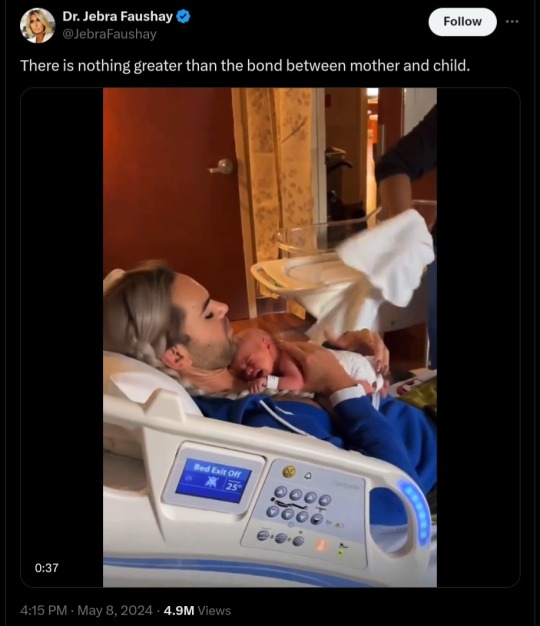
This is who posted it

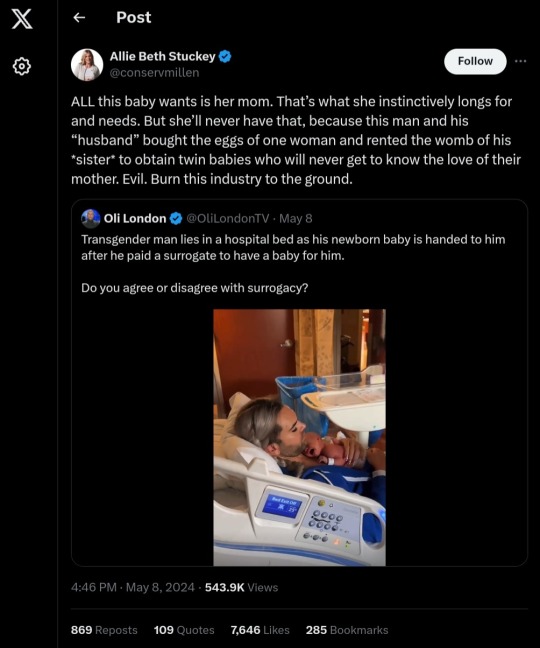
#Anti surrogacy sunday#Surrogacy exploits women#Babies are not commodities#Babies being created with no biological mother to check on on them#Surrogacy agencies don't do background checks
13 notes
·
View notes
Text
Two seperate men are having issues with getting passports for the babies they purchased? Nothing sounds suspicious about that.
https://www.progress.org.uk/passport-delays-for-babies-born-in-cyprus-via-surrogacy/
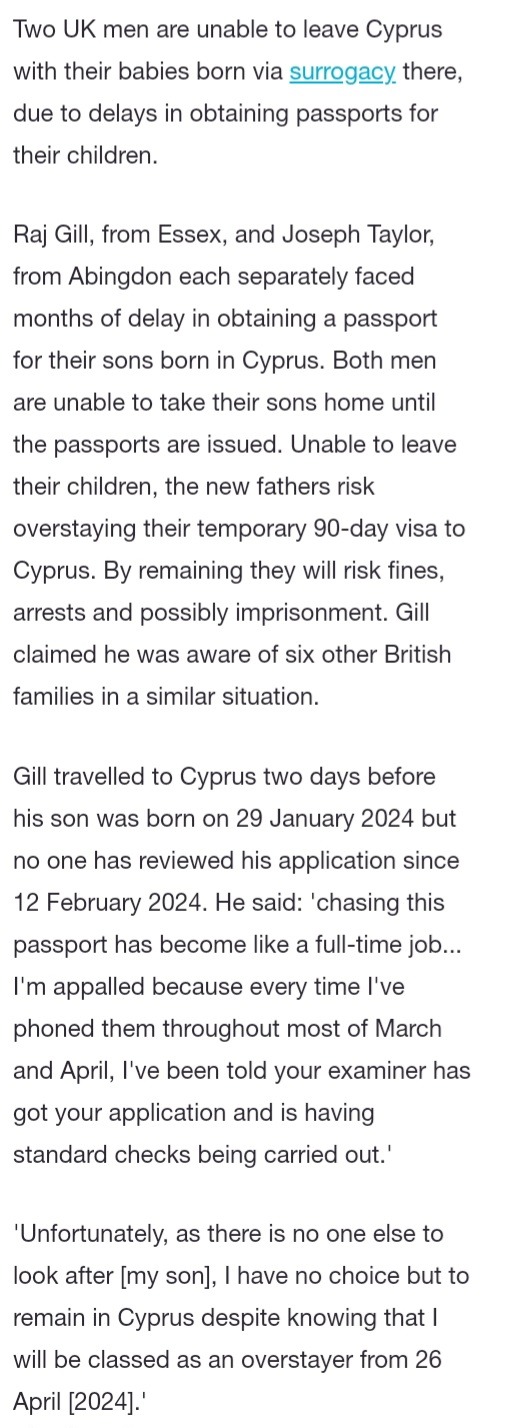
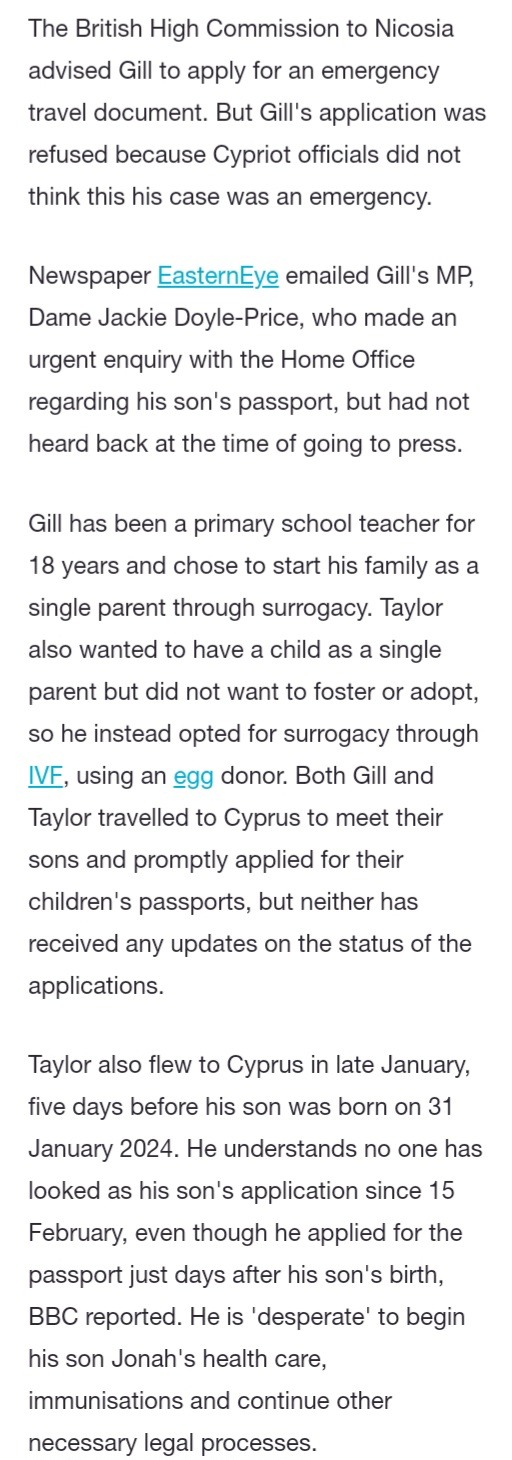
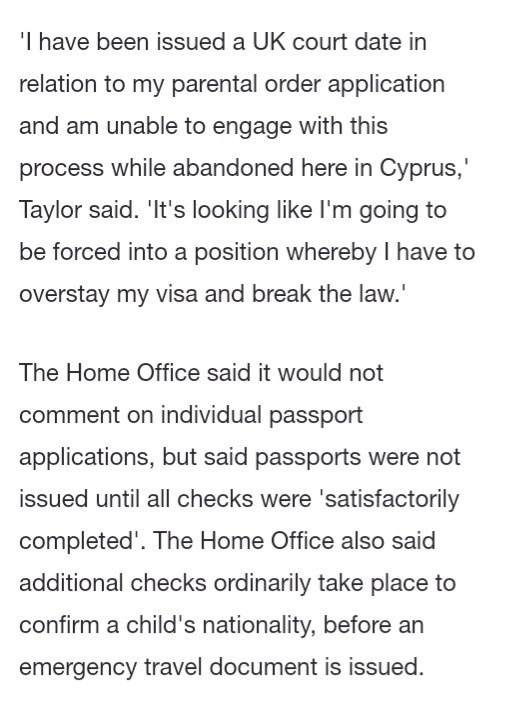
#Cyprus#UK#International surrogacy is human trafficking#No one is entitled to biological offspring#One parent wanted to be a dad but didn't want to adopt or foster?#Or is it because he would have been rejected for adoption?#Anti surrogacy sunday#Men using an egg donor and a surrogate to create a child that no legal mother
18 notes
·
View notes
Text
Ladies, always keep stickers on you
China’s Surrogacy Debate Extends to Women’s Toilets
From universities to hospital toilets, women are finding themselves surrounded by small ads recruiting surrogacy candidates as well as customers. They, and some companies, are hitting back.
By Yang Caini
May 15, 20233-min read #gender#surrogacy
Women in China are covering up surrogacy ads in toilets with stickers and lipstick as they try to discourage other women from becoming surrogates or take up their services.
In late April, a video of an anonymous woman covering up a surrogacy ad with stickers in a women’s bathroom in a hospital in the Guangxi Zhuang Autonomous Region went viral online.
Her actions were widely praised, with netizens sharing similar experiences about covering up surrogacy ads they encounter: “I erased these sorts of ads in the toilet of a movie theater.” “I’ve seen ads like this in dorms and school bathrooms.” “They can be found in all three toilets in a Changsha shopping mall.”
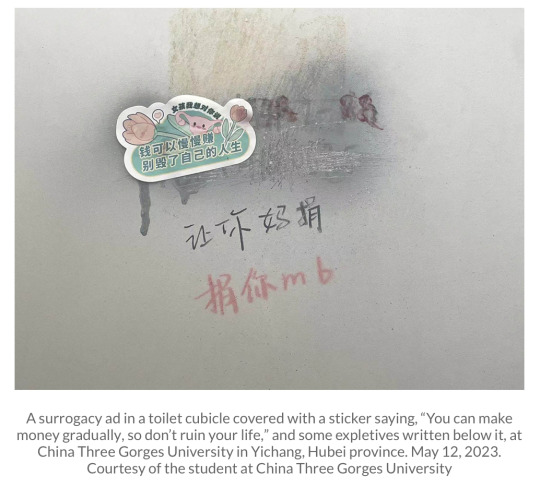
These ads look to recruit surrogates as well as customers. They are usually made up of very few words, with a price and a contact number provided. Many also guarantee a son, the favored sex in China.
Five university students from five different cities told Sixth Tone that they’ve seen the ads “countless times” in toilets. Zhao Yifei, a master’s degree student at Sun Yat-sen University in Guangzhou, said that these ads can be found in almost every toilet on campus. She sometimes feels conflicted when scratching them out with her keys.
“On the one hand, I think (surrogacy) can help those families who cannot conceive because of physical reasons. On the other hand … the most likely result is that the rich use surrogacy in large numbers and exploit the poor,” said Zhao.
Commercial surrogacy is banned in China, together with all sales of gametes, fertilized eggs, and embryos. The prohibition has led to the emergence of black markets and cross-bordersurrogacy services that target infertile and same-sex couples.
Surrogate mothers in China can receive up to 280,000 yuan ($40,282) for their services, while customers reportedly pay up to 1.1 million yuan for a surrogate baby with a chosen sex.
The question of whether to legalize surrogacy in China is a heated debate. In 2017, state-run media People’s Daily published an article that discussed legalizing surrogacy to ease the country’s falling birth rate and help infertile senior couples. Opponents, however, decry the practice for exploiting vulnerable women.
Li, who insisted on only using her surname, has kept a marker pen and anti-surrogacy stickers in her handbag since 2019, when she first erased a surrogacy ad in a shopping mall toilet with her lipstick in her hometown of Zhengzhou, the capital city of the central province of Henan.
“I’m embarrassed to say it, but I was thinking about whether the lipstick can still be used afterwards. But this was only for a few seconds — after all, this matter is much more important than lipstick,” Li, 26, told Sixth Tone.
Afterwards, Li purchased anti-surrogacy stickers in case she ran into the ads again. Some of these stickers mention that they are 30 centimeters long, the same length as a needle used for retrieving a woman’s egg. She hopes this scares women thinking about surrogacy by showing what it will mean in practice.

Some women’s products manufacturers, including sellers of pads and skincare products, are supporting these anti-surrogacy efforts by gifting customers free anti-surrogacy stickers with their purchases.
SISCOM, an online vendor with over 40,000 followers on e-commerce platform Taobao selling feminist merchandise, began giving customers free anti-surrogacy stickers in 2021. “Surrogacy exploits women. It’s banned in China. You will be punished for it,” the stickers read, with a reporting hotline included.
Qiqi, co-owner of SISCOM, told Sixth Tone that she has seen many of these ads herself.
“Sometimes I can’t help but feel that the people who make these ads are so smart … The toilet compartments are so private that you can hardly catch them and ban them,” she said.
Women’s public toilets have been in the news before. In 2020, advocates launched a campaign to install pad-sharing boxes in women’s toilets, which swept across the country.
Editor: Vincent Chow.
#China#anti surrogacy sunday#Anti exploiting women#Babies are not commodities#Stickering#Couples are willing to pay more for a boy#Retrieving eggs uses a needle 30 centimeters long#Surrogacy exploits women. It’s banned in China. You will be punished for it
61 notes
·
View notes
Text
Speakers and hosts agreed that instead of regulating the practice of surrogacy, which would only create demand, efforts should be made to highlight that surrogacy means, in essence, the commodification of children who become objects of surrogacy agreements, which is a deep violation of their human dignity.“
The European Christian Political Movement together with the offices of Members of the European parliament Bert Jan Ruissen (ECR) and Miriam Lexmann (EPP) organized on 23 May a conference on parenthood policies in the European Union, with a focus on the issue of surrogacy.
The two keynote speakers invited to provide expertise on the matter were Adina Portaru, Senior Counsel for the faith-based legal advocacy organization ADF International and Olivia Sarton, the scientific director of the French children’s rights organization Juristes Pour l’Enfance (Lawyers for Childhood).
The conference came as a response to the European Commission’s recent proposal for a EU-certificate of parenthood which is currently being debated in the European Parliament. This initiative would put pressure on member state governments to sanction surrogacy even though a country may not allow the practice.
It also comes as a contradiction to what the Commission has repeatedly said on various occasions: that the European institutions do not have competenceover issues like family, marriage, parenting, etc.
The hosts suggested that surrogacy fuels abuse, human trafficking, violating the rights of vulnerable women and children, in essence violating human dignity. The practice commodifies both children and women’s wombs, which is unacceptabl, they said.
Olivia Sarton underlined that surrogacy is a new form of exploitation that takes advantage of the bodies of women and appropriates the children they bear. She added that the conditions under which many women consent to the practice (state of need and psychological fragility) cast doubt on whether they freely gave their consent. She also made reference to the Casablanca Declaration, which calls for the universal abolition of surrogacy.
According to Portaru, the above-mentioned proposal of the European Commission puts into practice a very specific objective that the EU has pursued and promoted in the past years, captured in the slogan: “If you are parent in one country, you are parent in every country”. For her, this means that “if one EU country recognizes, for example, a US judgment which recognizes parenthood emanating from a surrogate agreement, that relationship or birth certificate will have to be recognized throughout the EU. Therefore, de facto, all kinds of surrogacy will be allowed and justified through the proposed regulation”.
Speakers and hosts agreed that instead of regulating the practice of surrogacy, which would only create demand, efforts should be made to highlight that surrogacy means, in essence, the commodification of children who become objects of surrogacy agreements, which is a deep violation of their human dignity.
#Europe#european union#Juristes Pour l’Enfance (Lawyers for Childhood)#The European Christian Political Movement#Anti surrogacy sunday#surrogacy exploits women#Babies are not commodities#no one is entitled to biological children#Casablanca declaration
66 notes
·
View notes